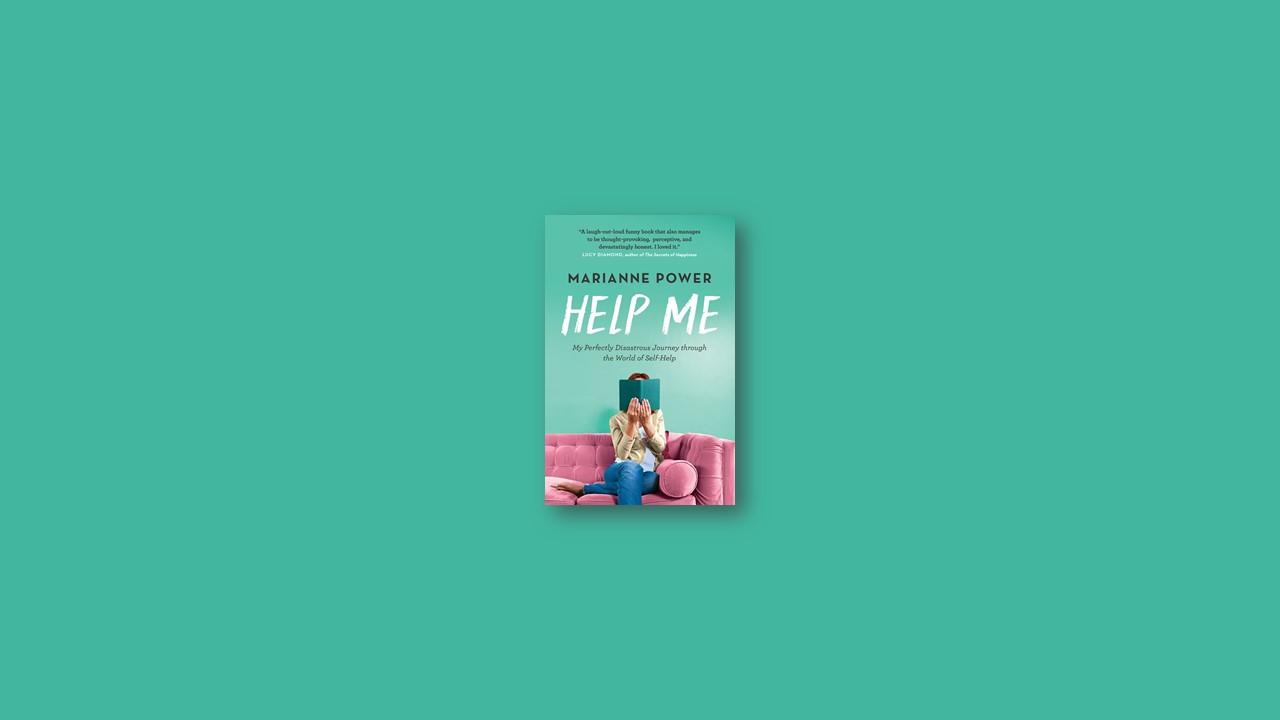Feel the Fear and Do It Anyway, by Susan Jeffers
Susan’s basic premise is that if we sit around waiting for the day that we feel brave enough to do the things we want to do, we’ll never do anything.
The secret of happy and successful people is not that they are any less scared, she says, but that, you guessed it, they ‘feel the fear and do it anyway’.
In fact, according to Susan, we should be scared every day because that’s a sign that we’re pushing ourselves and moving forwards. If you are not feeling any fear you are not growing.
Money, a Love Story, by Kate Northrup
Kate says that we all think that if we just had more money then we’d be OK, but you only need to look at all the lottery winners who are penniless within a couple of years to see that that’s not the case.
She argues that just as crash diets won’t work unless you understand why you overeat, no attempts at saving and budgeting will work unless you understand why you are the way you are with money and that understanding usually comes from looking at your childhood.
So if you grew up in a family that said, ‘money is the root of all evil,’ that’s going to play out your whole life. And if you grew up in a house where money was being thrown around – in my case, literally – then that’s going to have an effect too.
More importantly, Kate says that our relationship with money is a ‘microcosm of the relationship we have with ourselves’.
She argues that if you love yourself you look after your money. People who don’t look after their money – either by spending too much, getting into debt, or keeping themselves in the dark about how much they have – are not ‘free spirits’; they are actually self-sabotaging
The Secret, by Rhonda Byrne
You can have anything you want in life if you just believe.
The man of your dreams, the house of your dreams, the job of your dreams, millions of pounds . . . all yours, if you just think positively enough. No need to work, study or do anything, really – just wish for it.
I know, wonderful, isn’t it? What the hell have we been making life so complicated for?
The Secret, it’s all down to something called the ‘law of attraction’, which states that ‘thoughts become things’. So, if you think about money, you’re going to get lots of money. Think about debt and that’s what you’ll get more of.
‘Thoughts are magnetic and thoughts have a frequency,’ says Byrne. ‘As you think thoughts, they are sent out into the Universe, and they magnetically attract all like things that are on the same frequency.’
F**k It: The Ultimate Spiritual Way, by John C. Parkin
‘F**k It’ is an expression that says that – ultimately – nothing matters that much.
It’s self-help for people who don’t like self-help.
John explained that F**k It doesn’t mean doing nothing – it just means not caring so much about the outcome. You can go for the sweet (or the job, or the man, or the house) but you do it with a relaxed attitude and accept that what will be will be. And in fact, if you’re too tired to go for the sweet (or the job, or the man, or the house), then sod it – don’t. Have a nap. Take a year off. Take your life off.
All easier said than done, of course. Most of us have been brought up with the message that we have to work hard, push ourselves and never give up. No pain, no gain. We wear the exhaustion of our twelve-hour days in the office like a badge of honour. But why does life have to be so hard? Really, why? Should life be punishing? Or should it be enjoyed? And why did the thought of enjoying life feel so naughty? So bold?
John believes, ‘If we find the courage to loosen up our hold on things . . . to stop wanting so much . . . to stop working and striving so much . . . something magical happens . . . we naturally start getting what we originally wanted but without the effort . . .
Unleash the Power Within, with Tony Robbins
Tony’s message is that anything is possible if we just get our minds and bodies into the right state. He says we are all defined by our limiting beliefs and if we get rid of them, then ‘The Impossible just gets done’
According to Tony, there are six human needs that drive absolutely everything we do.
The first need is for Certainty/Comfort – this is our need to feel in control and secure. The second is the opposite: our need for Variety and Uncertainty. The third need is Significance. We all need to feel important and unique. Tony explained that some of us get a feeling of significance from our work, some achieve it by having a flash car or by getting a thousand Twitter followers. Tony said that you can even get significance by committing crimes – sounds strange but if you hold a knife up to someone you are suddenly very important in their eyes. Need four is Love and Connection. Need five is Growth – ‘If you’re not growing, you’re dying,’ according to Tony – whether that’s growing your business, your relationships, your education, etc. And the final need is for Contribution – ‘Life’s not about me; it’s about we,’ says Tony.
The 7 Habits of Highly Effective People, by Stephen R. Covey
Habit 1: ‘Be proactive’
We may not be able to control what happens to us but we can control our reaction to it. Stop blaming others, stop being a victim, take responsibility for yourself, your actions, your words and your thoughts.
Habit 2: ‘Begin with the end in mind’
How do you want people to talk about you at the end of your life? Keep that in mind every single day.
Habit 3: ‘Put first things first’
We all get distracted by emails and work dramas, but remember to focus on what is important to us rather than what seems urgent.
Habit 4: ‘Think win-win’
Real success should not occur at the expense of others.
Habit 5: ‘Seek to understand/then be understood’
Go into conversations prepared to listen – really listen – to the other person.
Habit 6: ‘Synergize’
Once you’ve really listened and worked to create win-win situations with others, amazing things happen.
Habit 7: ‘Sharpen the saw’
We are the saw in this scenario. In order to keep being the best you can be you need to be a ‘sharp saw’ not a tired, blunt one. We stay ‘sharp’ by keeping physically and mentally fit, taking time out to rest and looking after our spiritual and emotional well-being.
Covey says that most of us spend our lives climbing up ladders that are leaning against the wrong wall. We need to get clear about what we really want in life, what’s important to us, what our purpose is, and then every day we should live according to that vision. And the best way to get clear about what that vision is, according to Covey, is to imagine your own funeral and imagine what you’d like others to say about you.
The Power of Now, by Eckhart Tolle
We all have a voice that ‘comments, speculates, judges, compares, complains, likes, dislikes and so on,’ says Tolle.
Quite often the voice isn’t even focusing on what’s happening now, it’s rehashing some old situation or worrying about an imagined one in the future.
‘It is not uncommon for the voice to be a person’s own worst enemy. Many people live with a tormentor in their head that continuously attacks and punishes them and drains them of vital energy. It is the cause of untold misery and unhappiness as well as disease,’ writes Tolle.
Tolle explains that this voice stops us from ever enjoying the only thing that’s real: the Now. Only by living in the Now can we find peace and joy.
These moments are precious but if we pay attention we realize they’re happening all the time.
Daring Greatly, by Brené Brown
‘We’re all afraid we’re not enough,’ Tony Robbins says. ‘At the core, there’s a place where people feel they’re not smart enough, young enough, old enough, rich enough, funny enough, something enough. And it’s the worst feeling because, underneath that, our fear is then, “I won’t be loved.”’
Eckhart Tolle agrees. He says: ‘that feeling that something is wrong with you, is not a personal problem of yours. It is a universal, human condition. You may be surprised to know that there are millions . . . billions of people on the planet who have the same thought pattern. It is part of the human ego.’
Brené says that when we feel shame we do several things. First, we try to be perfect. We think that if we can just get thinner, smarter, more successful, then we’ll feel OK and people will love us and we won’t get hurt.
When that doesn’t work – and it never does – we try another approach: we numb our feelings of shame. We watch television. We drink. We eat too much. We take drugs. Brown thinks that numbing is why obesity, addiction and depression are so rife.
Then when the numbing and the perfectionism doesn’t work, we go down the third route: we cut ourselves off, shut down our feelings, decide to go it alone.
Brené Brown writes: ‘Joy comes to us in moments – ordinary moments. We risk missing out on joy when we get too busy chasing down the extraordinary.’
You Can Heal Your Life, by Louise Hay
Hay thinks that self-love has nothing to do with being arrogant or full of yourself. Self-love is about caring for yourself, being compassionate with yourself, accepting all your little quirks.
She says: ‘When people start to love themselves more each day, it’s amazing how their lives get better. They feel better. They get the jobs they want. They have the money they need. Their relationships either improve, or the negative ones dissolve and new ones begin.’
But loving yourself is not easy.
Hay describes how many of her clients refuse to say ‘I love and approve of myself’ in front of the mirror. Some can’t even look at themselves without crying. They say they can’t love themselves because they are too ugly, too fat, too unsuccessful, too damaged. They say they’ll love themselves when they lose the weight, get the job, find the husband.
In self-help land the news is frowned upon. It’s a source of negativity and misery. It will bring you down. Better to walk around the block repeating affirmations or read about the power of positive thinking than engage in the ugly, cruel world.


